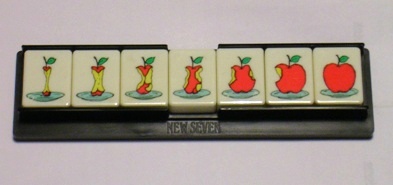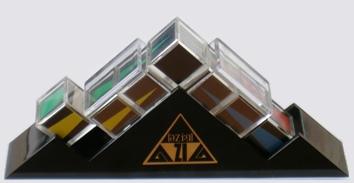New Seven / Azig


New Seven is a Japanese puzzle made by Kasawa. It is simply a frame containing
seven tiles in a row. You place the tiles in any order into the frame and then
try to put them back in order. The only moves you are allowed to do are lifting
out the middle tile and sliding it into the row from either end. The tiles have
pictures of an apple in them progressively being eaten up. The packaging also has
drawings of a version which has a red cartoon crocodile on it.
Azig by Central Hobby is another Japanese puzzle that extends this idea slightly.
The base is an upright triangle, and the seven cubeshaped pieces lie on its slopes.
The middle piece is at the apex, with three cubes resting on each slope. A move on this puzzle
is to take out either one of the bottom cubes, causing the other cubes on that side
to slide down, and placing it at the apex. This is essentially the reverse of a move
on the New Seven puzzle. In the solved state six solid triangles should be visible
on the sides of the puzzle. A cube can be reoriented during a move, so that makes it
more difficult to figure out where each cube belongs. An extra set of inserts is provided
so that the design on the cubes can be changed to show coloured dots instead of parts
of triangles, making it more difficult to determine the orientations.
The only English words in the packaging call this puzzle a "Comfortable Fullness Intellectual Puzzle".
If your browser supports it, you can click on the link below to play with a
Javascript version of New Seven.
The number of positions:
There are 7 tiles, giving 7! = 5040 possible positions. These are all solvable.
In Azig the orientation of the cubes can be changed, so it is 247
times as many positions, which is 7!·247 = 23,115,815,976,960.
It does have 4 solutions however - 2 essentially different ones that can be built
in reverse order as well.
I ran a computer search to find the number of positions at each distance from
the solved position in the New Seven puzzle. The results are shown in the tables
below. It shows that it can always be solved in at most 20 moves (12.069 on average).
The extra column shows the results if the reverse ordering is also considered a solved
position. In that case it can be solved in no more than 17 moves (11.015 on average).
| Moves | # Positions | # Positions 2 |
|---|
| 0 | 1 | 2 |
|---|
| 1 | 2 | 4 |
|---|
| 2 | 4 | 8 |
|---|
| 3 | 8 | 16 |
|---|
| 4 | 14 | 28 |
|---|
| 5 | 26 | 52 |
|---|
| 6 | 48 | 88 |
|---|
| 7 | 87 | 156 |
|---|
| 8 | 158 | 272 |
|---|
| 9 | 273 | 446 |
|---|
| 10 | 447 | 684 |
|---|
| 11 | 681 | 938 |
|---|
| 12 | 944 | 1,074 |
|---|
| 13 | 1,012 | 792 |
|---|
| 14 | 759 | 326 |
|---|
| 15 | 387 | 106 |
|---|
| 16 | 131 | 44 |
|---|
| 17 | 38 | 4 |
|---|
| 18 | 12 | |
|---|
| 19 | 6 | |
|---|
| 20 | 2 | |
|---|
| Total | 5,040 | 5,040 |
|---|
The two antipodes for the standard puzzle are 5674321 and 7654123.
The four antipodes when reverse order is allowed are 3216745, 3412765, 5476123, 5672143.
Notation:
Let L denote putting the middle tile on the left of the row, and R denote
putting it on the right.
Solution:
New Seven:
- Bring tile 1 to the left side (locations 1, 2, or 3) if it isn't there already.
This is easily done by bringing it to the middle with R moves and then doing L.
- If tile 2 does not lie directly to the right of tile 1, then make it so as follows:
1. If tile 2 is on the left side then bring it to the middle with L moves.
2. If tile 2 is in the middle then do R to bring it to the right hand side.
3. Do L moves until tile 1 lies in location 3, directly to the left of centre.
4. Do R moves until tile 2 lies in the centre, next to tile 1.
- Put tiles 1 and 2 in their correct locations using L moves.
- Solve tile 3 as follows:
1. If tile 3 is in the middle then do R to bring it to the right hand side.
2. Do L so that tile 2 lies in location 3, directly to the left of centre.
3. Do R moves until tile 3 lies in the middle, next to tile 2.
4. Do L L L, putting tiles 1,2,3 in their correct locations.
- Put tile 7 in its correct location using R moves.
- There are now 5 unsolved possibilities remaining:
1234657: Do the move sequence LLR LLR R LLR LLR
1235467: Do the move sequence LLR R LLR LLR LLR
1235647: Do the move sequence LLR LLR LLR R LL
1236457: Do the move sequence LLR R LLR LLR LL
1236547: Do the move sequence LRR LRR LRR LRR L
Azig:
The following image shows the internal numbering of the cubes. It will be solved if
they are placed in this order, the left side with blue on top and green to the front, white
on the back, and the right side with red on top, yellow on the front, orange on the back.

The following solution method is very similar to the New Seven solution.
- Bring cube 3 to the left side and in the correct orientation (locations 1, 2, or 3).
This is easily done by bringing it to the outside with R or L moves and placing it
in the centre with the blue on top, green in front. Then do L to move it to the left.
- Put cube 2 correctly oriented adjacent to cube 3 as follows:
1. If cube 2 is on the left side then bring it to the middle with L moves, orienting it with blue on top, green on the front.
2. If cube 2 is in the middle then do R to bring it to the right hand side.
3. Do L moves until cube 3 lies in location 1, at the bottom of the slope.
4. Do R moves until you can put cube 2 in the centre, orienting it with blue on top, green on the front.
5. Do L to put cubes 2 and 3 in their correct locations.
- Solve cube 1 as follows:
1. If cube 1 is in location 1, but wrongly oriented, then do L four times, orienting cube 1 during the first move so that blue is on top and green on the front.
2. If cube 1 is in the middle then do R to bring it to the right hand side.
3. Do L so that cube 2 lies in location 1, at the bottom of the slope.
4. Do R moves until you can place cube 1 in the middle, with the correct orientation.
5. Do L L L, putting cubes 1,2,3 in their correct locations.
- Put cube 5 in its correct location using R moves, oriented such that red is on top and yellow on the front.
- There are now 6 unsolved possibilities remaining:
1234567: Do the move sequence R R R R
1234576: Do the move sequence LLR LLR R LLR LLR
1237564: Do the move sequence LLR R LLR LLR LLR
1237546: Do the move sequence LLR LLR LLR R LL
1236574: Do the move sequence LLR R LLR LLR LL
1236547: Do the move sequence LRR LRR LRR LRR L
Remember to orient cubes during the R moves whenever necessary so that red is on top, and yellow on the front.
The second solution has the cubes in the order 7254361 (or in reverse, 1634527).
Nice sequences:
To reverse the order of the pieces, do: L R L R L R L.
To produce the second solution in Azig, do: LR RL RL LR RL RL LR.




